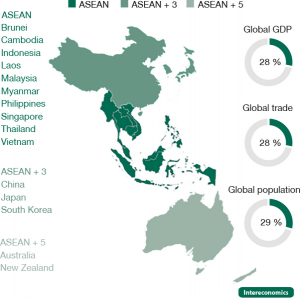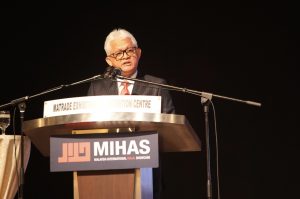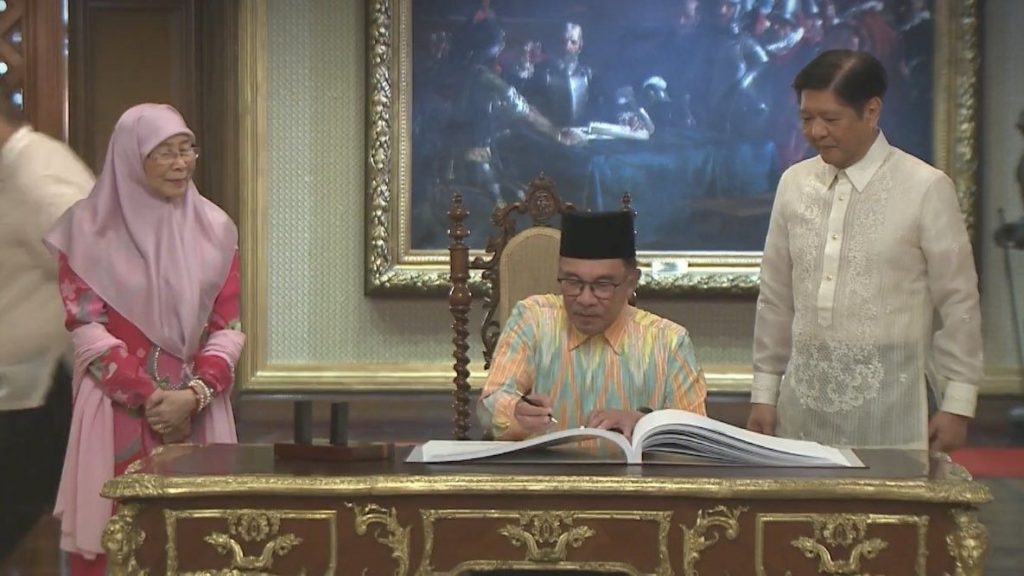 Written by Mushamir Mustafa, Malaysia Digest
Written by Mushamir Mustafa, Malaysia Digest
With 50% of existing halal businesses and 50% of halal certifications coming from non-Muslims in Malaysia, CEO of Tentu Teguh Sdn Bhd (a subsidiary of UMLand) Noor Abdul Salam reaffirmed that halal is not confined to the Muslim world, citing a growing sector in the halal industry.
“Halal is for everybody. Statistics from SME Bank for Malaysia confirm that of the 12 billion manufacturing products exported overseas, it mentions that 50% of halal businesses are controlled and managed by non-Muslim companies’ he told Malaysian Digest at a press conference after signing the agreement for the Johor Halal Park.
The initiative is a joint venture development between United Malayan Land and the Johor State Government along with J-Biotech to develop a 350-acre land in the 1st Integrated Bio-Halal Industrial Development in Pasir Gudang, Johor.
The “park” is meant to “cater to the needs of conducive bio-based ecosystems and to enhance the Johor Bio-economy initiatives, particularly in development of bio-based R&D and Halal Research”, the CEO of J-Biotech Wan Amir Jeffrey explained during the press conference.
Tentu Teguh CEO Noor elaborated further on the far-reaching potential of halal industries as it is open to participation by all, highlighting that 50% of the halal business are currently owned by non-Muslims.
“This reflects that halal businesses are not confined to religious matters – its a business. Now we are looking at the global halal market. Every Malaysian can tap into this business and it’s up to them whether they want to tap into it or not.

“We have set up a one stop business centre, a 50% partnership with the state government and are supported by the federal agencies in terms of incentives, and we are looking for an additional 5 years for this particular area. The benefit is huge and as far as developers are concerned, we are very focused and do take care of our investors.”
Referring to how ‘halal airline’ Ryanair are managed by non-Muslims as an example, Noor explains that ones does not need to be a Muslim to run a halal business and that Islam is universal.
“Halal has only got to do with halal toyyiban, where halal means what is permissible and toyyiban means clean and hygienic – this means that anybody can be a part of this.”
He also expressed his optimism that Malaysia has massive potential to tap into the halal market within the next few years.
“Malaysia, as an Islamic country, are under-utilizing our potential. We are only exporting 0.5% of the market, that is RM12 billion. 5% is a ten-fold increase which translates to RM120 billion, so that means halal can be a lucrative business. If you compare it to oil, previously oil was sold at USD120 per barrel, but now it’s down to USD30.
“But for the halal business it is forever growing. Food is always a necessity as the population gets bigger.”
He cites the Johor Menteri Besar’s speech that there are 2.6 billion Muslims around the world, comprising 25% of the global population, which is set to increase to 50% by 2050.
“By 2050 with that many Muslims, the market will go up. If we focus on the halal business with the right incentives given and with the proper accreditation, we can go very far if we work together – the private sector supported by the state and federal governments.”
The agreement was witnessed by Chief Minister of Johor Y.A.B Dato’ Mohamed Khaled Nordin and Chairman of UMLand Tun Musa Hitam.
Halal Park is accredited as HALMAS Halal Hub by the Halal Development Corporation and the venture is expected to draw wide interest as it offers locals and international investors a well-planned freehold ownership in property that has a multitude of business-centric incentives related to its biotechnology businesses.
Noor concluded by saying that “together these various business and strategic collaborations between State Government and Federal Government’s Iskandar Regional Development Authority (RIDA) 20-year masterplan is targeting to attract an estimated RM25.0 billion in investments within the Eastern Gate Development of Iskandar Malaysia, as well as with MIDA, Biotech Corp, SME Bank, SME Corp, Teraju and SME’s”.
“We aim to build a conducive Halal and Bio-based ecosystem to support the R&D as well as the commercialization for AgriBio and food production sectors. It is a platform where we pool the soft infrastructure – financial incentives, human capital development, business and operational set-up facilitation,” he said.
Johor Halal Park will be built in three development phases with a gross development value of RM1.5 billion.



